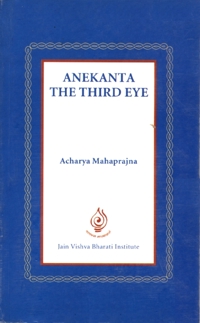
A gentleman asked me, "Is independence possible?" I said, "Do not ask that. Ask if dependence is possible." He replied, "Dependence is very clear." To that I asked, "Why then is independence not clear?"
Independence and dependence are relative. They are connected with each other. If there is dependence then there will be independence and if there is independence there will be dependence. Both are inter-connected. One cannot exist alone. Absolute independence or absolute dependence cannot exist. If they exist then they will exist together or not at all.
This is the concept of anekanta. People think anekanta complicates matters. It does not give a solution. Its reply is not clear. A person is not able to understand anything. Anekanta says man is good as well as bad. How can this be a practical principle? If there is the thief in the trader and the trader in the thief then how can any conclusion be arrived at? Then what is the use of even hunting for the trader? We may as well collect a bunch of thieves for even in a thief, there is a trader.
Practically speaking, this will not work. It will only worsen matters. The question then is whether social behaviour can be based on anekanta. Is it possible to model our practical life on the basis of anekanta? Can any conclusion be reached on the basis of anekanta? It does not take us to the point of conclusion, to the stage of the definite. Anekanta teaches you to look both ways. A person learns to look at this side as well as that. Nothing concrete emerges.
That syaadvad takes man on a spin is not a new argument. It is age old. Anekanta does not lead a person anywhere but just leaves him hanging in the middle. The language of anekanta is that of the indefinite. It is not certain.
It seems that this subject has not been reflected upon deeply enough and that is why such an idea has come up. If the subject had been reflected upon deeply then the emerging idea would have been that anekanta is the only principle that leads you to a definite conclusion. Apart from this there is no other principle that can lead you to a definite conclusion. Only with the help of anekanta can we reach a conclusion.
One man is bad, a cheat, a thief. No one wants to enter into business with him. This decision is taken on the basis of the present day circumstances. But a man's present mode does not say everything. There are four fundamentals of anekanta:
- matter,
- place,
- time,
- state.
All our interactions are relative.
All our decisions will be
- matter - relative,
- place - relative,
- time - relative,
- state - relative.
No decision can be taken without considering these dependent principles.
One person is a thief, loafer, bandit. How one should behave with him will be decided on the basis of the present situation. However, this cannot be a comprehensive conclusion because the man may have many other traits or potential. If we do not take into consideration his other traits then all our other matters come to a stop. If we refuse to accept that which will happen in the future, then there will be no room for progress.
A child is very naughty. If on the basis of his behaviour in the present the child is branded useless, then his future would be bleak. No parent ever does that. No teacher negates the possibilities of his student's improvement.
Take my own case. In my childhood I was dull. If at that stage Acharya Tulsi had labelled me as useless then I would never have become 'Mahapragya' (Highly knowledgeable), today. If on the basis of the present, future possibilities are negated, then all possibilities of progress are lost. Decisions are taken on the basis of the present, but alongside if the door of possibilities is left open, nothing is lost. Otherwise progress would be obstructed.
This event took place in the great scientist Einstein's childhood. He went to school. The teacher said, "you are dull, you cannot do maths. Your effort is wasted. To do maths it is necessary to have a sharp brain."
That conclusion was taken on the basis of the present and so relative to time.
The same Einstein became one of the world's greatest mathematicians and earned the title of the most brilliant man of his times.
Anekanta is a great solution. It has not been understood. It never complicates. It does not talk indecisively. It leads you to the definite.
 Acharya Mahaprajna
Acharya Mahaprajna
